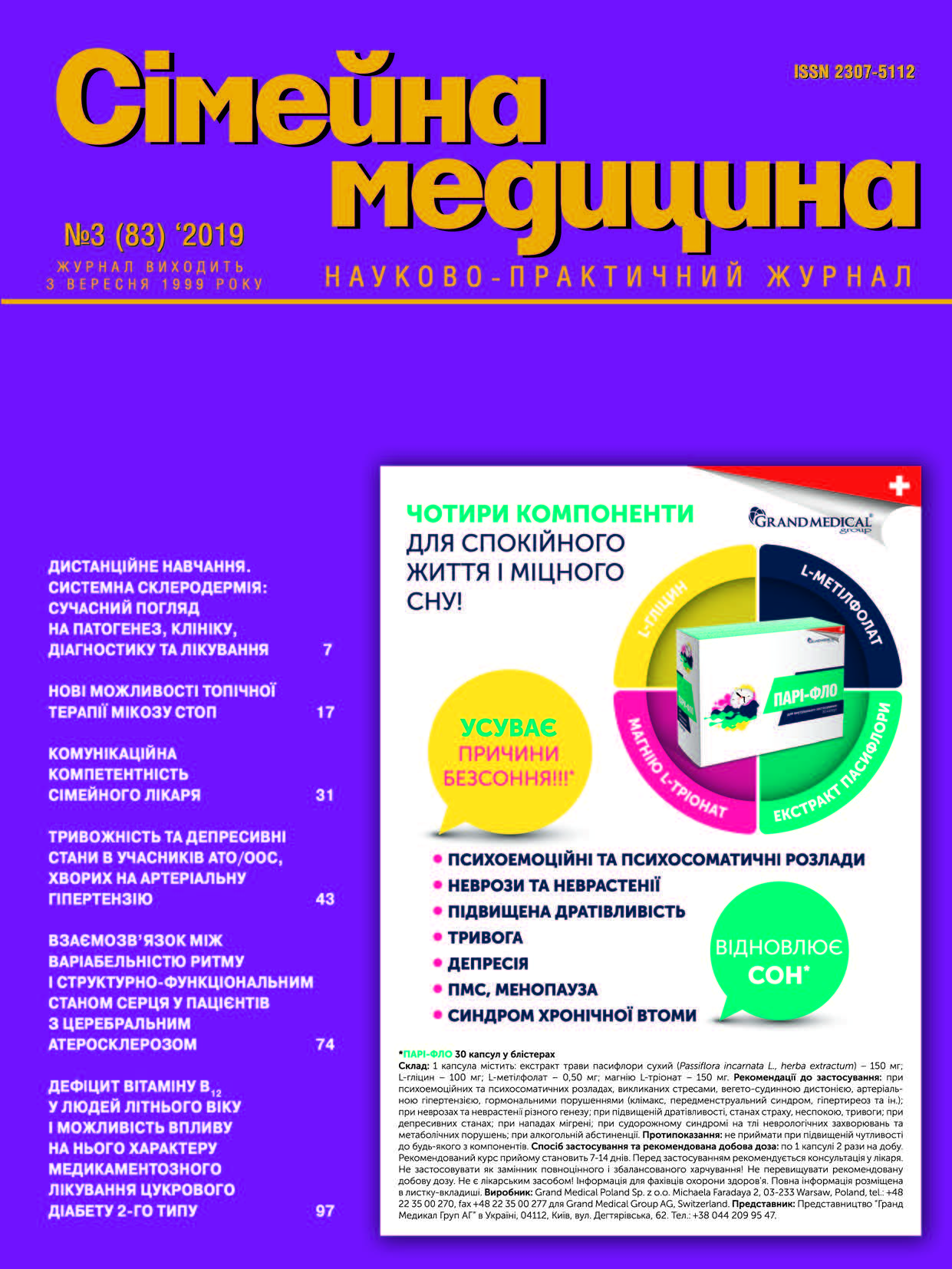The Significance of Hereditary Factor in the Development of Chronic Kidney Disease (Glomerulonephritis)
##plugins.themes.bootstrap3.article.main##
Abstract
The objective: of the research was to evaluate the risk of chronic kidney disease: glomerulonephritis (CKD:GN) development by antigens of blood groups of AB0 and Rhesus (Rh) systems.
Materials and methods. We examined 315 patients (166 men and 149 women) with CKD:GN which manifested by urinary syndrome (US) (asymptomatic proteinuria and/or hematuria). A survey of 1428 healthy individuals was conducted to determine the populational distribution of blood groups phenotypes of AB0 and Rh systems.
Results. The value of the relative risk of CKD:GN with US occurrence in men with phenotype A (II) versus 0 (I) prevailed in 7.79 times the same in women and it was in 5.15 times higher in the latter with phenotype AB (IV) versus A (II) than the same in men. The common feature was a high chance to contract the studied pathology in carriers of phenotype AB (IV) Rh– versus 0 (I) Rh–. Individuals of both genders with group 0 (I) Rh– may be resistant to the development of the disease.
Conclusions. Gender dimorphism consisted in the fact that men with phenotypes AB (IV) Rh– and A (II) Rh– versus 0 (I) Rh–, women with phenotypes AB (IV) Rh– and B (III) Rh– versus 0 (I) Rh– and A (II) Rh– had the highest risk to contract a disease. Somewhat lower risk of disease occurrence was possible in the presence of phenotypes A (II) Rh+ in men and AB (IV) Rh+ in women.##plugins.themes.bootstrap3.article.details##

This work is licensed under a Creative Commons Attribution 4.0 International License.
Authors retain the copyright and grant the journal the first publication of original scientific articles under the Creative Commons Attribution 4.0 International License, which allows others to distribute work with acknowledgment of authorship and first publication in this journal.
References
Бабич П.Н. Применение современных статистических методов в практике клинических исследований. Сообщение второе. Применение критерия хи-квадрат / П.Н. Бабич, А.В. Губенко, С.Н. Лапач // Укр. мед. часопис. – 2004. – № 2 (40). – С. 138–144.
Бабич П.Н. Применение современных статистических методов в практике клинических исследований. Сообщение третье. Отношение шансов: понятие, вычисление, интерпретация / П.Н. Бабич, А.В. Губенко, С.Н. Лапач // Укр. мед. часопис. – 2005. – № 2 (46). – С. 113–119.
Бочков Н.П. Клиническая генетика: учебник / Н.П. Бочков, В.П. Пузырев, С.А. Смирнихина; под ред. Н.П. Бочкова. – 4-е изд., доп. и перераб. – М.: ГЭОТАР-Медиа, 2011. – 592 с.
Колодченко В.П. Поширеність груп крові системи АВ0 у людей різного віку / В.П. Колодченко // Пробл. старения и долголетия. – 2011. – Т. 20, № 4. – С. 458–464.
ABO Blood Group and Risk of Thromboembolic and Arterial Disease / S.K. Vasan, K. Rostgaard, A. Majeed [et al.] // Circulation. – 2016. – Vol. 133, № 15. – P. 1449–1457. doi: 10.1161/CIRCULATIONAHA.115.017563.
ABO blood group is a risk factor for coronary artery disease in patients with poor blood pressure control / B. Zhou, N. Wu, C. Zhu [et al.] // Clin Exp Hypertens. – 2017. – Vol. 39, № 4. – P. 366–370. doi: 10.1080/10641963.2016.1267190.
Association between ABO Blood Group and Risk of Congenital Heart Disease: A 6-year large cohort study / B. Zu, G. You, Q. Fu [et al.] // Sci Rep. – 2017. – № 7. – P. 42804. doi:10.1038/srep42804.
Distribution of ABO/Rh blood groups and their association with hepatitis B virus infection in 3.8 million Chinese adults: A population-based cross-sectional study / J. Liu, S. Zhang, M. Liu [et al.] // J Viral Hepat. – 2018. – Vol. 25, № 4. – P. 401–411. doi: 10.1111/jvh.12829.
Farhud D.D. A Brief History of Human Blood Groups / D.D. Farhud, M.Z. Yeganeh // Iranian J. Publ. Health. – 2013. – Vol. 42, № 1. – P. 1–6.
Franchini M. The prognostic value of ABO blood group in cancer patients / M. Franchini, G.M. Liumbruno, G. Lippi // Blood Transfus. – 2016. – Vol. 14, № 5. – Р. 434–440. doi: 10.2450/2015.0164-15.
How can genetics and epigenetics help the nephrologist improve the diagnosis and treatment of chronic kidney disease patients? / A. Witasp, T.J. Ekstrom, M. Schalling [et al.] // Nephrol. Dial. Transplant. – 2014. – № 29. – P. 972–980.
Meta-Analysis of Non-O Blood Group as an Independent Risk Factor for Coronary Artery Disease / H. Takagi, T. Umemoto [et al.] // Am J Cardiol. – 2015. – Vol. 116, № 5. – P. 699–704. doi: 10.1016/j.amjcard.2015.05.043.





